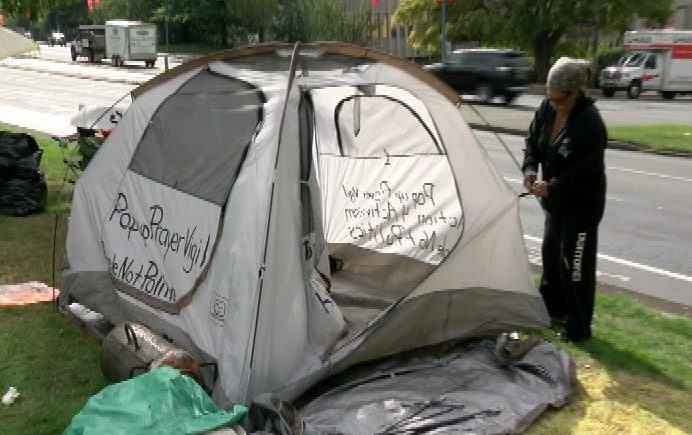
WATCH: The number of people chronically homeless in Victoria is down but officials say the overall need is actually greater than ever. Tess van Straaten reports.
You don’t have to look very hard to see that homelessness is a big problem in Victoria.
“It’s pretty hard to find housing and with the length of time I’ve been on the street I could probably have built a house,” says Robert, who was camping at a make-shift homeless camp at Topaz Park and asked that his last name not be used.
For the last decade, the Greater Victoria Coalition to End Homelessness has tried to fulfill its goal ? without much success ? but that’s beginning to change.
“For the very first time since 2010, we’re very happy to report a slight decrease in the number of people experiencing chronic homelessness in the region,” says Victoria mayor and coalition board co-chair Lisa Helps.
In the last year, 111 people experiencing chronic homelessness ? defined as 180 days or three or more separate episodes in one year ? were housed, more than double the coalition’s goal of 50 for 2016/17.
But those on the front lines say the overall demand is greater than ever and shelters like Our Place are turning away around 20 people a night when it’s not even winter.
“With the cost of living, the housing shortage, the opioid crisis, it’s putting huge amount of pressure on vulnerable populations in our city and we’re seen a lot of need out there,” says Don Evans of Our Place.
Yet, despite some progress, housing advocates are questioning how much of an impact the Coalition to End Homelessness has actually had.
Instead, they credit the controversial tent city one on the courthouse lawn with all of the housing gains we’ve seen in the last year.
“There weren’t offers of places like Choices or My Place or Mount Edwards or Super 8 or Johnson Street until tent city so I think it was really the work of the citizens and residents of tent city,” says housing advocate and tent city organizer Christine Brett.
Mayor Helps agrees Tent City played a role but she points out the Coalition, which shifted its mandate last year, also secured $60 million to build new housing in the region.
“Without the coalition, we wouldn’t have seen that $60 million investment and we would have seen the stop-gap measures in response to tent city,” says Helps. “We wouldn’t have five years worth of funding.”
For those on the streets, it’s help that can’t come soon enough.





